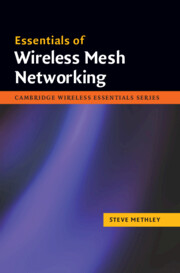Book contents
- Frontmatter
- Contents
- Preface
- Acknowledgements
- 1 Mesh overview and terminology
- 2 Attractive mesh attributes and applications
- 3 Fundamentals of mesh technology
- 4 Mesh capacity, scalability and efficiency – hypothesis testing
- 5 Mesh susceptibility
- 6 Mesh services and quality of service
- 7 Summary of potential mesh pitfalls to avoid
- 8 Appropriate telecommunications applications for mesh
- 9 Successful mesh implementations
- 10 Wireless sensor networks (WSNs) as mesh networks
- Abbreviations
- Selected definitions
- Appendix: Mobility models
- About the author
- Index
- Mesh hints and tips
4 - Mesh capacity, scalability and efficiency – hypothesis testing
Published online by Cambridge University Press: 01 March 2010
- Frontmatter
- Contents
- Preface
- Acknowledgements
- 1 Mesh overview and terminology
- 2 Attractive mesh attributes and applications
- 3 Fundamentals of mesh technology
- 4 Mesh capacity, scalability and efficiency – hypothesis testing
- 5 Mesh susceptibility
- 6 Mesh services and quality of service
- 7 Summary of potential mesh pitfalls to avoid
- 8 Appropriate telecommunications applications for mesh
- 9 Successful mesh implementations
- 10 Wireless sensor networks (WSNs) as mesh networks
- Abbreviations
- Selected definitions
- Appendix: Mobility models
- About the author
- Index
- Mesh hints and tips
Summary
Having covered the fundamentals of meshes, we now arrive at the point where we may begin to consider the big and often asked questions about mesh, four of which we consider together, via our list of hypotheses. As a reminder, these are that
meshes self-generate capacity,
meshes improve spectral efficiency,
directional antennas help a mesh, and
meshes improve the overall utilisation of spectrum.
We will examine them formally, via analysis of existing peer reviewed publications, followed by some more recent analysis and insight of our own [1, 2]. A key problem in assessing the published literature is that different assumptions are made in different published papers; a direct comparison is thus at risk of being inconsistent. We spend some time at the outset to ensure we avoid this issue.
We will bear in mind that we are predominantly interested in our six application examples of Chapter 2. This will set helpful bounds to our scope for testing the hypotheses.
When we look at Hypothesis 1 which is concerned with capacity, we form our initial viewpoint via a simple thought experiment, which looks at how we expect the capacity of a mesh might behave versus demand, relative to the known case of cellular. This is followed by a summary of four important peer reviewed research papers in the field, which concern system capacity. We contend that the important conclusions presented in these papers were never intended to be used by readers as evidence that a real-world mesh can self-generate capacity.
- Type
- Chapter
- Information
- Essentials of Wireless Mesh Networking , pp. 43 - 98Publisher: Cambridge University PressPrint publication year: 2009



